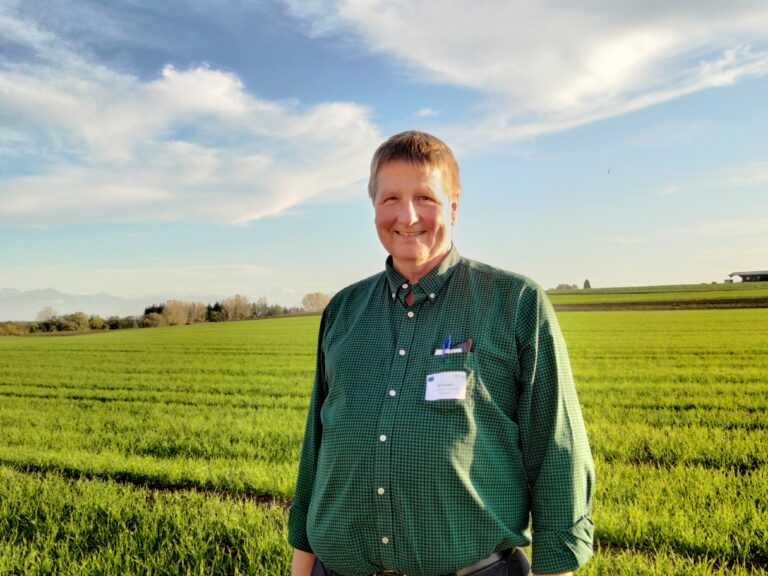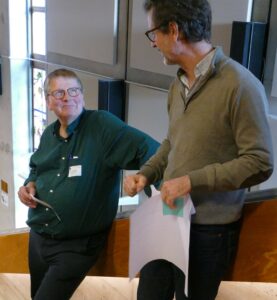“Reducing pesticide use is a must for the future”
Per Kudsk - Professor at Aarhus University (Denmark)

Per Kudsk during a farm visit organized in the context of the second IPMWORKS Annual Meeting in Switzerland.
Per Kudsk is Professor and Head of the Crop Health Section at the Department of Agroecology at Aarhus University in Denmark, one of the 31 partners of the H2020 IPMWORKS project. His research activities focus on weed control in arable crops, becoming increasingly involved in recent years in the study of Integrated Pest Management (IPM). He advocates low reliance on pesticides, “a must” for the future of farming. He explains this during an interview conducted in the course of the second IPMWORKS Annual Meeting held in Nyon, Switzerland.
Question. What is your role within the IPMWORKS project?
Answer. I am involved in developing some of the IPMWORKS training materials. My Institute is also involved in supporting two hubs in Denmark.
Q. What is the situation in Denmark regarding pesticide use?
A. We have had pesticide action plans in Denmark since the 1980s, meaning that for a long time we have had targets for reducing pesticide use. There is a long tradition in this matter and although it has been going up and down, I think that overall, there is high awareness among Danish farmers and Danish advisers that reducing pesticide use is an absolute must for the future.
Firstly, because there is a number of reasons for adverse effects on the environment and on human health, but also because pesticides won’t be available forever. So farmers should start looking into alternative methods if they want to be farming effectively in the future. In Denmark, we have developed what we call a pesticide load index and our target now is to reduce these pesticide loads. We have actually been quite successful. In the last four or five years, we have seen a steady decline in pesticide impacts. So farmers have been substituting pesticides for those which have less impact.
Q. IPMWORKS is at its mid-term. Could you highlight main lessons learned so far from your participation in the project?
A. The focus of IPMWORKS, in contrast to other EU projects that I have been involved in, is really on the farmers, to encourage them to take up IPM as a way of doing crop protection. I think that the experiences from this project so far have shown that this is a transition process. We have to keep on pushing and promoting that process so that farmers can gradually move towards a situation where they are less and less dependent on pesticides.
It can be a very difficult process because a lot of the ways of doing crop protection have been practised by farmers for many, many years. And changing the whole set up, which is often needed to implement IPM, is a very big step for most farmers.
And so I think that we are on the right track, but I also think that this process will need to go on beyond IPMWORKS.
Q. Regarding the methodology, if you had to pick one of the tools within the IPMWORKS project to expand IPM adoption, which one would you choose?
A. The idea of the IPMWORKS hubs is very much built on the experiences of the DEPHY network in France, where they have many hubs and have had some success actually bringing farmers together and reducing pesticide use.
I would say that this is very much the same experience that we have had in Denmark for many years. It has been the approach that the farmers’ advisory service has been using in Denmark: trying to bring farmers together in groups, sharing their experiences, and having an advisor to act as facilitator of the process.
I think that this way of working is extremely effective compared to, for example, just producing a lot of written material. You need to bring farmers together and you need to have farmers sharing the experiences, because that is really what can make progress. One farmer looking over the fence, seeing that his neighbour is doing something else and is obtaining a good result is probably one of the best ways of promoting IPM.
